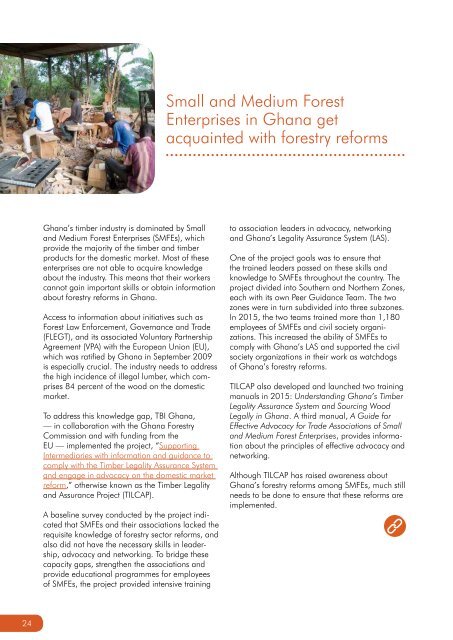timber sector
ar2015-web-markets
ar2015-web-markets
Create successful ePaper yourself
Turn your PDF publications into a flip-book with our unique Google optimized e-Paper software.
Small and Medium Forest<br />
Enterprises in Ghana get<br />
acquainted with forestry reforms<br />
Ghana’s <strong>timber</strong> industry is dominated by Small<br />
and Medium Forest Enterprises (SMFEs), which<br />
provide the majority of the <strong>timber</strong> and <strong>timber</strong><br />
products for the domestic market. Most of these<br />
enterprises are not able to acquire knowledge<br />
about the industry. This means that their workers<br />
cannot gain important skills or obtain information<br />
about forestry reforms in Ghana.<br />
Access to information about initiatives such as<br />
Forest Law Enforcement, Governance and Trade<br />
(FLEGT), and its associated Voluntary Partnership<br />
Agreement (VPA) with the European Union (EU),<br />
which was ratified by Ghana in September 2009<br />
is especially crucial. The industry needs to address<br />
the high incidence of illegal lumber, which comprises<br />
84 percent of the wood on the domestic<br />
market.<br />
To address this knowledge gap, TBI Ghana,<br />
— in collaboration with the Ghana Forestry<br />
Commission and with funding from the<br />
EU — implemented the project, “Supporting<br />
Intermediaries with information and guidance to<br />
comply with the Timber Legality Assurance System<br />
and engage in advocacy on the domestic market<br />
reform,” otherwise known as the Timber Legality<br />
and Assurance Project (TILCAP).<br />
A baseline survey conducted by the project indicated<br />
that SMFEs and their associations lacked the<br />
requisite knowledge of forestry <strong>sector</strong> reforms, and<br />
also did not have the necessary skills in leadership,<br />
advocacy and networking. To bridge these<br />
capacity gaps, strengthen the associations and<br />
provide educational programmes for employees<br />
of SMFEs, the project provided intensive training<br />
to association leaders in advocacy, networking<br />
and Ghana’s Legality Assurance System (LAS).<br />
One of the project goals was to ensure that<br />
the trained leaders passed on these skills and<br />
knowledge to SMFEs throughout the country. The<br />
project divided into Southern and Northern Zones,<br />
each with its own Peer Guidance Team. The two<br />
zones were in turn subdivided into three subzones.<br />
In 2015, the two teams trained more than 1,180<br />
employees of SMFEs and civil society organizations.<br />
This increased the ability of SMFEs to<br />
comply with Ghana’s LAS and supported the civil<br />
society organizations in their work as watchdogs<br />
of Ghana’s forestry reforms.<br />
TILCAP also developed and launched two training<br />
manuals in 2015: Understanding Ghana’s Timber<br />
Legality Assurance System and Sourcing Wood<br />
Legally in Ghana. A third manual, A Guide for<br />
Effective Advocacy for Trade Associations of Small<br />
and Medium Forest Enterprises, provides information<br />
about the principles of effective advocacy and<br />
networking.<br />
Although TILCAP has raised awareness about<br />
Ghana’s forestry reforms among SMFEs, much still<br />
needs to be done to ensure that these reforms are<br />
implemented.<br />
24


